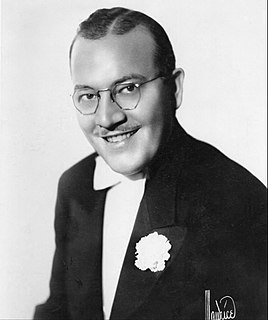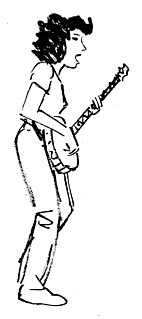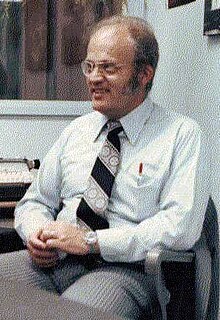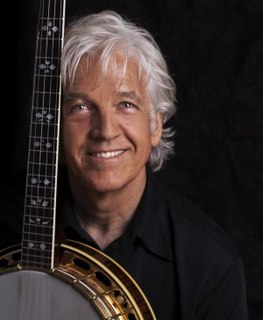The banjo is a stringed instrument with a thin membrane stretched over a frame or cavity to form a resonator. The membrane is typically circular, and usually made of plastic, or occasionally animal skin. Early forms of the instrument were fashioned by African-Americans in the United States, adapted from African instruments of similar design. The banjo is frequently associated with folk and country music, and has also been used in some rock songs. Several rock bands, such as the Eagles, Led Zeppelin, and The Allman Brothers, have used the five-string banjo in some of their songs. Historically, the banjo occupied a central place in African-American traditional music and the folk culture of rural whites before entering the mainstream via the minstrel shows of the 19th century. Along with the fiddle, the banjo is a mainstay of American styles of music, such as Bluegrass and old-time music. It is also very frequently used in traditional ("trad") jazz.

Béla Anton Leoš Fleck is an American banjo player. An acclaimed virtuoso, he is an innovative and technically proficient pioneer and ambassador of the banjo, bringing the instrument from its bluegrass roots to jazz, classical, rock and various world music genres. He is best known for his work with the bands New Grass Revival and Béla Fleck and the Flecktones. Fleck has won 14 Grammy Awards and been nominated 33 times.

Tony Furtado is an American singer-songwriter, banjoist, and guitarist.

Preservation Hall Jazz Band is a New Orleans jazz band founded in New Orleans by tuba player Allan Jaffe in the early 1960s. The band derives its name from Preservation Hall in the French Quarter. In 2005, the Hall's doors were closed for a period of time due to Hurricane Katrina, but the band continued to tour.

Edwin Ellsworth Peabody, known as Eddie Peabody was an American banjo player, instrument developer and musical entertainer whose career spanned five decades. He was the most famous plectrum banjoist of his era.

George Edward Bruns was an American composer of music for film and television. His accolades include four Academy Award nominations, and three Grammy Award nominations. He is mainly known for his compositions for numerous Disney films spanning from the 1950s until the 1970s, among them were Sleeping Beauty (1959), One Hundred and One Dalmatians, The Absent-Minded Professor,, The Sword in the Stone (1963), The Jungle Book (1967), The Love Bug (1968), The Aristocats (1970), and Robin Hood (1973).

Walter Gerhardt "Pee Wee" Hunt was an American jazz trombonist, vocalist, and bandleader. Hunt was born in Mount Healthy, Ohio. He developed a musical interest at an early age, as his mother, Sadie, played the banjo and his father, Edgar C., played violin. He had a younger sister, Marian, and younger brother, Raymond. The teenage Hunt was a banjoist with a local band while he was attending college at Ohio State University where he majored in Electrical Engineering, and during his college years he switched from banjo to trombone. He graduated from the Cincinnati Conservatory of Music. He joined Jean Goldkette's Orchestra in 1928.

Cynthia Nan Sayer is a jazz banjoist and singer and a founding member of Woody Allen's New Orleans Jazz Band.
Joseph Hilton "Nappy" Lamare was an American jazz banjoist, guitarist, and vocalist.
Huey Long was an American jazz and R&B guitarist and singer and band leader who was a member of the quartet The Ink Spots. Long's career began in the 1925 as a banjoist before moving to guitar. He became a member of the Ink Spots in 1945 and participated in spinoff bands in the 1960s.
Jon Marks was a British jazz pianist.
Creole George Guesnon was an American jazz banjoist, guitarist, and singer.
Fred Sokolow is an American multi-instrumentalist and author of a library of instructional books and DVDs for guitar, banjo, Dobro, mandolin, lap steel and ukulele.

Charlie Tagawa was a Japanese-born American musical entertainer and banjoist. In a music career spanned seven decades, he was regarded as one of the best contemporary four-string banjo players. He performed regularly across the U.S. and in Japan, where he was known professionally as "Japan's Harry Reser". A 2003 inductee into the National Four-String Banjo Hall of Fame, Tagawa often performed as the headline act at banjo jazz festivals and shows. He was also the international goodwill ambassador for the Peninsula Banjo Band.

The Peninsula Banjo Band is American musical group and 501(c)3 non-profit foundation dedicated to preserving the musical legacy of the four-string banjo as well as raising money for cancer-related and other notable charities. The group is based in Northern California, around San Jose and San Francisco and has performed publicly every week since 1966. One of its other contributions is in the form of music education (scholarships), frequent free public performances, and the hosting of an annual jazz festival that has featured the best of the professional and amateur banjo community since the 1970s. Formed in 1963, the PBB is known worldwide as one of North America's premier banjo jazz groups that has headlined numerous times over its history and been the opening act for notable entertainers and musical groups of the 1970s, 1980s, 1990s, and 2000s.
Jimmy Mazzy is a traditional jazz banjo player and vocalist.

The University of California Jazz Ensembles, also known as the UC Jazz Ensembles, UC Jazz, or UCJE, is the student jazz organization founded in 1967 on the University of California, Berkeley, campus. Founded in 1967, it comprises one or more big bands, numerous jazz combos, a vocal jazz ensemble, an alumni big band, and instructional classes. With a mission statement to foster a community for the performance, study, and promotion of jazz at U.C. Berkeley, its Wednesday Night big band provides free concerts every Thursday noon on Lower Sproul Plaza, its various units perform throughout the San Francisco Bay Area including area high schools, travel to collegiate jazz festivals, and perform overseas, and for many years it sponsored the annual Pacific Coast Jazz Festival. It also provides master classes by its instructors and clinics by prominent guest artists. It has nurtured numerous musicians who have become professional jazz musicians and educators. UC Jazz Ensembles is one of three groups, with the Cal (marching) Band and UC Choral Ensembles, forming Student Musical Activities (SMA), a department within Cal Performances on the U.C. Berkeley campus. Its members are primarily U.C. Berkeley undergraduate and graduate students, representing many academic disciplines.
Jerron "Blind Boy" Paxton is an American musician from Los Angeles. A vocalist and multi-instrumentalist, Paxton's style draws from blues and jazz music before World War II and was influenced by Fats Waller and "Blind" Lemon Jefferson. According to Will Friedwald in The Wall Street Journal, Paxton is "virtually the only music-maker of his generation — playing guitar, banjo, piano and violin, among other implements — to fully assimilate the blues idiom of the 1920s and '30s, the blues of Bessie Smith and Lonnie Johnson."

Tim Weed is a multi-instrumentalist singer-songwriter known for virtuosity on the banjo. Raised a Southern California surfer, Weed learned the banjo at age 17 and played professionally at 18. He was in various bands and he worked as a studio musician singing and playing electric guitar in the Greater Los Angeles Area. He lived in Japan for a time producing records for Sony-Epic, and he lived on the island of Maui where he rediscovered the banjo. Weed settled in Tucson, Arizona, for eight years, playing in local bands. Working with luthier Dennis Coon he designed and built a seven-string hybrid of banjo and guitar called the "Sevan". He released a solo banjo album: Milagros; in mid-2005 the music was featured on NPR. In 2008 Weed moved to Northern California where he released an album of Americana, world music and bluegrass songs: Soul House. In 2020 he released a classical album, Light and Dark, with the Prague Symphony Orchestra. Weed plays concerts and festivals, and he teaches banjo privately.
Tony Williamson is an American internationally renowned mandolin player from Chatham County, North Carolina, whose compositions integrate everything from traditional Piedmont string band tunes to classical music and jazz.










